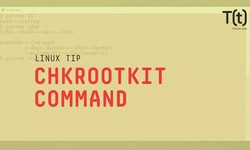malware
(6)
How to use the chkrootkit command. Linux Tips
In this Linux tip, we’re going to look at the chkrootkit command. It’s a command that will examine your system for rootkits -- generally malicious software that enables unauthorized access to a system. To install chkrootkit on Ubuntu/Deb...
Jacob Enderson · 02 September 2020 · 4.6KSafeguarding the Digital Frontier: Unveiling the Evolving Landscape of Malware Threats
In our interconnected world, the omnipresent danger of malware poses an ongoing risk to individuals and organizations alike. Malware, a combination of malicious software and code, serves as a potent weapon wielded by cybercriminals to infiltrate systems, exploit vulnerabilities, and wreak havoc. Embracing hacking capabilities becomes even more acc...
Swathi Priya · 3 weeks ago · 1Safeguarding Success: The Imperative of WordPress Security in Online Business
Introduction: In the dynamic world of online business, where digital storefronts thrive and transactions flow seamlessly, the importance of robust security measures cannot be overstated. For many entrepreneurs, WordPress has emerged as the go-to pla...
Moon Sakib · 31 January · 1Strengthen Your WordPress Security with Our Easy-to-Understand eBook!
Your website's security is crucial, and that's why I'm excited to share our new resource with you – the "WordPress Malware Removal and Security" eBook. It's a guide that breaks down complex security jargon into simple, actionable steps to help...
Most.Afroza Khatun · 13 January · 1"Defensive Strategies: A Deep Dive into Virus and Malware Removal Techniques"
Introduction In the ever-evolving landscape of cybersecurity, the battle against viruses and malware is constant. Understanding effective removal techniques is crucial to maintaining the integrity of your digital environment. This deep dive explores defensive strategies, providing insights into cutting-edge virus and malware removal techniques. I...
just read · 13 November 2023 · 1How to check computer is overlooked in 2022
Some software can track and save information about your Internet browsing habits, such as browser type, IP addresses, and device kind. Many PUPs, such as this one, are classified as adware or malware and track a variety of user data. Many of the data obtained by these rogue apps may be personally identifiable and shared with third parties, p...
Willmar Furgesin · 30 June 2022 · 18

